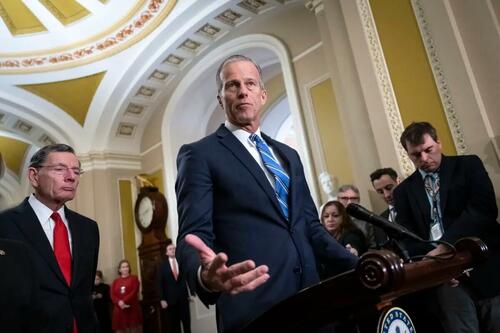
Republicans May Override Senate’s Nonpartisan Referee To Pass Trump’s Agenda: What To Know
Authored by Joseph Lord and Jackson Richman via The Epoch Times,
Republicans have set the stage to potentially override the Senate parliamentarian as they move ahead with President Donald Trump’s policy proposals.

Republicans are seeking to pass Trump’s entire agenda—including tax cuts, energy policy, border policy, defense, and other areas—using the reconciliation process.
While this process allows the party to bypass the 60-vote filibuster threshold, which kills most partisan bills on arrival in the Senate, it’s heavily restricted. Rules governing its use prevent these types of bills from having a long-term impact on the deficit.
Ultimately, it’s up to the parliamentarian—the little-known referee in the Senate who interprets Senate rules—to decide what provisions make it into the final bill, and how long those provisions can last.
After Republicans released their resolution on April 2, Senate Majority Leader John Thune (R-S.D.) reported that Elizabeth MacDonough, the current parliamentarian, had given an initial green light to move ahead with the proposal under the Budget Act of 1974, which enables the reconciliation process.
Other questions linger that could still slow the legislation if the parliamentarian rules against Republicans. As Republicans move forward, leaders have given some indications that they won’t necessarily rely on the parliamentarian’s ruling about how to calculate the total financial impact of the bill.
Technically, the parliamentarian’s rulings aren’t binding on what the Senate does, and can be overridden by a simple majority of senators.
But historically, lawmakers have been hesitant to do so. The Senate operates largely on the basis of established customs, traditions, and guardrails—and the parliamentarian’s role has been established for decades.
Thus, should Republicans challenge any ruling from the parliamentarian—or the parliamentarian’s right to make a ruling—Democrats could interpret this as Republicans effectively “nuking” the filibuster, and could similarly disregard the rulings of the parliamentarian themselves in the future.
Here’s what to know about the burgeoning dispute—and the possibility that Republicans will “go nuclear” to override the parliamentarian.
Who Is the Parliamentarian?
A post established in 1935, the parliamentarian primarily serves to advise senators, staff, and others on the Senate’s arcane rules and procedures.
In recent decades, their most important role has involved refereeing reconciliation bills, which both parties often use when they have a trifecta in Washington.
Appointed by former Senate Majority Leader Harry Reid (D-Nev.) in 2012, MacDonough is the first woman to occupy the post—and she’s shown herself willing to defy both parties’ wishes at times.
MacDonough, who declined to be interviewed for this story, has described her view of her role as above partisanship.
“While serving its 100 members on a day-to-day basis, I still represent the Senate. … I represent the Senate with its traditions of unfettered debate, protection of minority rights, and equal power among the states,” she said in a 2018 commencement speech at Vermont Law School, which she attended.
In 2021, during the Biden administration, MacDonough ruled against the Democrats’ plan to include a $15 minimum wage and a pathway to citizenship in reconciliation bills.
Now, she’ll have a key role in making another decision that could put her in the majority party’s sights.

Senate Parliamentarian Elizabeth MacDonough (C) provides assistance during the certification of Electoral College ballots in the presidential election, in the House chamber at the Capitol in Washington on Jan. 6, 2021. J. Scott Applewhite/AP Photo
‘Tax Baseline Question’
Since the beginning, Senate Republicans have made clear that they hope to make any tax cuts included in their reconciliation package permanent, which would primarily include permanently extending the components of Trump’s 2017 tax cuts due to expire this year.
Under the rules of reconciliation, making any provision permanent requires compliance with the Byrd Rule—a restriction on reconciliation bills which requires that they not impact the deficit beyond a 10-year window.
Whether or not Republicans can meet this requirement depends in part on the baseline used to calculate the net impact on the deficit. There are two options: a “current policy” baseline and a “current law” baseline.
Republicans believe the current policy baseline will enable them to make their cuts permanent, and Budget Chairman Lindsey Graham (R-S.C.) used this standard in calculating the financial impact of the resolution.
While MacDonough has given approval to move the proposal forward in the reconciliation process, questions linger about whether Graham can make this call on his own. Republicans say he can.
Republicans Hesitant to Overrule
On the whole, Senate Republicans seemed hesitant to make any commitments to overruling the parliamentarian, though leaders have raised questions about whether they need MacDonough’s advice on this issue.
Following the April 1 Republican lunch, Thune and Majority Whip John Barasso (R-Wyo.) told reporters that the Budget Committee chairman could unilaterally make the legal determination on whether to use the current policy baseline.
“We think the law is very clear, and ultimately the budget committee chairman makes that determination,” Thune said. “But obviously, we are consulting regularly with the parliamentarian.”

Senate Majority Leader Sen. John Thune (R-S.D.) (C), accompanied by Sen. John Barrasso (R-Wyo.), left, speaks to reporters after a Senate policy luncheon at the Capitol in Washington on Feb. 25, 2025. Ben Curtis/AP Photo
When asked about the possibility of overruling MacDonough, Senate Republicans expressed confidence that the current policy baseline would be chosen.
“There’s clear and unequivocal precedent on current policy as the baseline,” Sen. Ted Cruz (R-Texas) told The Epoch Times, citing President Barack Obama’s use of the current policy baseline to extend Bush-era tax cuts in 2013. “I have every confidence that will be the conclusion here.”
Sen. Tommy Tuberville (R-Ala.) told The Epoch Times that Republicans have “no choice” but to respect the ruling, and was skeptical that her decision would be overridden.
Ultimately, the stage is set for a potential testing of the parliamentarian’s authority. It’s unclear whether Republicans intend to wait for her to make a ruling before moving forward, when that ruling could come, or what the final ruling would be.
Should it go against Republicans, it’s unclear whether they would go ahead anyway, as such a move could set a precedent for Democrats to use later.
Tyler Durden
Fri, 04/04/2025 – 14:40









